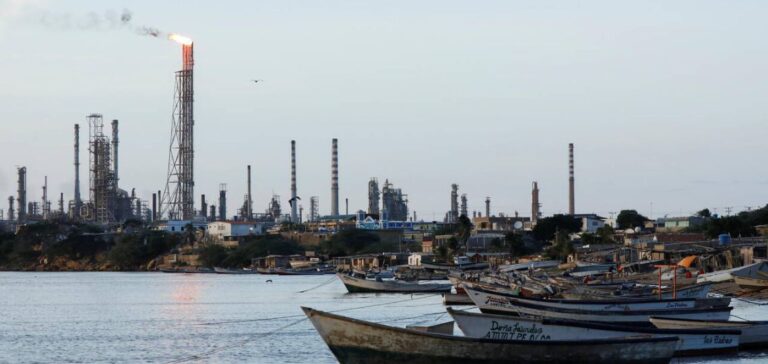Venezuela, once dubbed “Saudi Venezuela” because of its immense oil revenues, is going through a critical period. With the world’s largest oil reserves, the country now faces major challenges in revitalizing an industry in decline. The impact of corruption, mismanagement and international sanctions continues to weigh heavily on the Venezuelan economy. In addition, the pollution of Lake Maracaibo highlights the environmental consequences of the collapse of the oil industry.
The golden age of oil
Discovered in the late 19th century, oil became the main driver of the Venezuelan economy in the 1920s. In 1976, the country nationalized foreign companies to create Petróleos de Venezuela (PDVSA), the state-owned oil giant. This sector has financed most of the country’s major infrastructure, but PDVSA’s management has been marked by periods of corruption and disputed strategic decisions. Under the presidency of Hugo Chávez (1999-2013), PDVSA became a political tool, leading to massive layoffs in 2003-2004 that paralyzed the management and maintenance of the facilities. These decisions have led to a deterioration in infrastructure and a drastic drop in production, from 3.5 million barrels per day in 2008 to 400,000 barrels per day in 2020.
The collapse and its causes
Ineffective management and corruption caused a gradual collapse of the oil industry. Eugenio Montoro, former manager of PDVSA, points out that lack of maintenance and erroneous decisions have deteriorated refineries and facilities, contributing to a significant drop in production. U.S. sanctions imposed in 2018-2019, following Nicolás Maduro’s disputed re-election, exacerbated the crisis. Despite a slight easing of sanctions in 2023, Venezuela still depends on allies such as Russia, Iran and China to boost production, which currently stands at around one million barrels a day. Meanwhile, Lake Maracaibo, once a vital resource for fishing and tourism, has become a symbol of pollution and environmental inaction.
Pollution of Lake Maracaibo
Lake Maracaibo, the largest lake in South America, is now covered in an oil slick, seriously affecting the local ecosystem and fishing communities. The once bustling riverbanks are now black with crude oil, and fishermen struggle to scoop it up with their shovels – a painstaking task. Yordi Vicuna, a local fisherman, deplores the drastic drop in catches and the damage caused to nets by pollution. The eastern shore of the lake, at Cabimas, is littered with inactive derricks and abandoned hotels, turning the area into a ghost town. Guillermo Albeniz Cano, who worked on the beach at Puyuyo, explains that the thickness of the oil at the bottom of the water made swimming and fishing impossible. The situation is equally dire in Maracaibo, where crumbling infrastructure and “for sale” signs are omnipresent.
Sanctions and international relations
Sanctions have forced the Venezuelan government to look for alternatives. PDVSA Chairman Pedro Tellechea says Venezuela is in the midst of an industrial renaissance and aims to increase production. The licenses granted to Chevron, Repsol and Maurel & Prom testify to a desire to revive the sector with the help of foreign capital, despite unchanged American rhetoric on the need for democratic transition. The poor state of the infrastructure also has environmental repercussions, with frequent oil leaks in the main production basins. The country needs to strike a balance between boosting production and managing environmental challenges to avoid an ecological catastrophe.
Future prospects
With around 300 billion barrels of reserves, Venezuela has enormous potential to reposition itself on the world oil scene. Most of these reserves are concentrated in the historic Zulia-Falcon basin and the Orinoco oil belt. According to Pedro Tellechea, the country also has significant gas reserves, crucial for the energy transition. The future of the Venezuelan oil sector will depend on its ability to attract foreign investment, improve infrastructure management and maintenance, and navigate political and environmental challenges. The dream of reclaiming Venezuela’s oil industry remains ambitious, but realistic if these conditions are met. The environmental issue, in particular the pollution of Lake Maracaibo, will also have to be addressed to guarantee sustainable development.






















